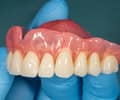Denturist: What They Do
According to the American College of Prosthodontists, around 36 million Americans are missing all of their teeth. Every year, 15 percent of them have dentures made. Some of the people who make those dentures are denturists. A denturist is not a dentist. Denturists are trained especially for creating dentures. They take impressions of the gums and any remaining teeth. These impressions help them to design and customize dentures. After the dentures are made, the denturist checks for comfort and fit.
Can dentists provide dentures? Yes, of course, they can and do. Sometimes dentists even refer patients to a denturist. It just depends on each individual. Seeing a denturist for dentures may be more cost-efficient and time-effective. Some states allow you to visit an independent health care professional called a denturist.
Education, Training, and Specialization for Denturist
Denturist’s education, training, and regulation vary around the country. It is a profession that is regulated on the state level. We’ll use Oregon as an example. In Oregon, denturists graduate with the equivalent of an associate's degree, according to the Oregon Health Authority. Additionally, they must put in 1,000 hours of supervised clinical practice, either through their college or through an approved supervisor. They then take a practical exam to become licensed to practice.
Pros and Cons of Seeing a Denturist
Denturists' services are cost- and time-effective, explains the Oregon State Denturist Association. They have a denture making lab on-site, which could be ideal if you’re on a budget.
Denturists are not dentists. They cannot examine or treat your gums, remaining teeth, or other parts of your mouth. Unlike dentists, denturists only specialize in denture services. To keep your mouth healthy, it's important to see a dentist regularly.
Caring for Your Dentures
Whether you see a dentist or a denturist, take care of your dentures. Dentures should be cleaned after each meal to remove food particles and bacteria. Brush your removable dentures with a special denture brush or a soft-bristled toothbrush. According to the American Dental Association, regular toothpaste can scratch your dentures. They recommend using a gentle cleaning denture cleanser or soaking your dentures overnight. Remove your dentures to clean them. Rinse them afterward.
If you are on a budget or just want to simplify the process, working with a denturist is a great idea. Denturists did not attend dental school. They specialize in dentures and only dentures. For all of your dental needs, make sure to see your dental professionals.
This article is intended to promote understanding of and knowledge about general oral health topics. It is not intended to be a substitute for professional advice, diagnosis or treatment. Always seek the advice of your dentist or other qualified healthcare provider with any questions you may have regarding a medical condition or treatment.
ORAL HEALTH QUIZ
What's behind your smile?
Take our Oral Health assessment to get the most from your oral care routine
ORAL HEALTH QUIZ
What's behind your smile?
Take our Oral Health assessment to get the most from your oral care routine
Join Us
Get the best of your oral health routine and take it to the next level with expert advice, recommendations, products and solutions and special offers.
Join Us
Get the best of your oral health routine and take it to the next level with expert advice, recommendations, products and solutions and special offers.















